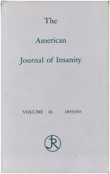Neuropsychological functioning in detoxified alcoholics between 18 and 35 years of age
Abstract
OBJECTIVE: The authors determined 1) cognitive functioning in detoxified alcoholics who had alcohol-related problems for a relatively brief time and 2) relationships between neuropsychological test scores and recent and chronic alcohol consumption patterns, childhood symptoms of hyperactivity/minimal brain dysfunction, and extent of familial alcoholism. METHOD: The subjects were 101 detoxified, drug-free alcoholics between 18 and 35 years of age who had consumed excessive amounts of alcohol (average of 114 g four to five times per week) for an average of 6 years. An average of 39 days after the last drink each alcoholic was given an extensive battery of neuropsychological tests assessing language skills, attention, motor skills, intelligence, memory, and cognitive functioning related to the frontal regions of the brain. RESULTS: Only four individuals evidenced mild cognitive dysfunction. Current psychiatric condition, anxiety and depressive states, and liver dysfunction were not related to cognition. Relationships of cognition of lifetime estimates of alcohol consumption (average of 189 kg) and number of days from last drink to testing were determined to be nonlinear and suggested that greater lifetime consumption predicted worse performance and that longer abstinence predicted better performance. Neither extent of familial alcoholism nor number of childhood signs and symptoms of hyperactivity/minimal brain dysfunction was predictive of cognition except that more antisocial behavior predicted poorer cognitive functioning. CONCLUSIONS: Cognition in young alcoholics, averaging 6 years of excessive alcohol consumption, was within normal limits, even though greater lifetime consumption predicted lower test scores and longer abstinence predicted higher scores.
Access content
To read the fulltext, please use one of the options below to sign in or purchase access.- Personal login
- Institutional Login
- Sign in via OpenAthens
- Register for access
-
Please login/register if you wish to pair your device and check access availability.
Not a subscriber?
PsychiatryOnline subscription options offer access to the DSM-5 library, books, journals, CME, and patient resources. This all-in-one virtual library provides psychiatrists and mental health professionals with key resources for diagnosis, treatment, research, and professional development.
Need more help? PsychiatryOnline Customer Service may be reached by emailing [email protected] or by calling 800-368-5777 (in the U.S.) or 703-907-7322 (outside the U.S.).



